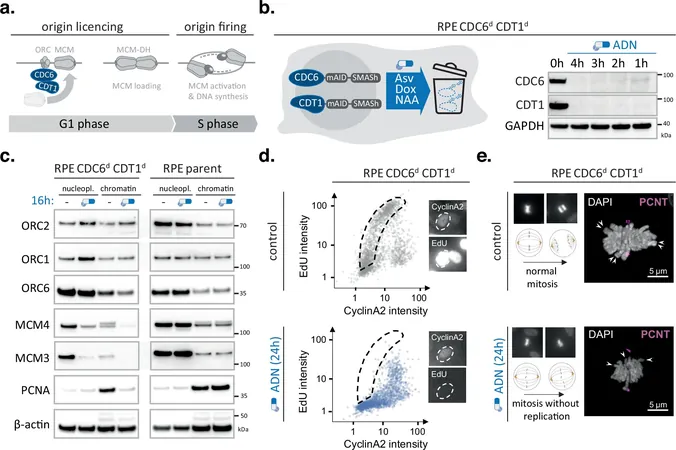
Revolutionary Study Reveals How DNA Replication Failure Could Transform Cancer Treatments
2025-09-15
Author: Rajesh
A Groundbreaking Discovery in Cancer Therapy
A groundbreaking study from Karolinska Institutet, featured in *Nature Communications*, uncovers an unexpected link between DNA replication and cancer therapy, revealing how specific proteins drive DNA replication licensing in human cells. This insight holds the potential to reshape our understanding of cancer treatments and pave the way for more targeted therapies.
The Game-Changing Role of CDK Proteins
At the heart of this research is the protein complex CDK4/6, which interacts with the famed RB tumor suppressor proteins. First identified during investigations of childhood retinoblastoma, the RB gene has long been regarded as the body's natural protector against cellular division gone awry. However, new findings indicate that RB is not just a gatekeeper of the cell cycle; it is also instrumental in preparing DNA for replication.
Dual Function Uncovered: A Catalyst for Change
Dr. Bennie Lemmens, the study’s senior author, highlights a key finding: "Our research demonstrates that CDK4/6 phosphorylation of RB serves a dual purpose—it both commits cells to divide and ensures that their genomes are ready to be copied correctly." This revelation could explain the high efficacy of CDK4/6 inhibitors in cancer treatments and suggests new pathways for developing even more effective therapies.
The Surprising Impact on Cancer Cells
Intriguingly, researchers discovered that combining CDK4/6 inhibitors with other therapies that block DNA licensing resulted in cancer cells dividing without successfully replicating their DNA. This disruption proved particularly damaging for cells lacking the protective p53 gene, often absent in many cancers.
Advanced Techniques Unlock New Possibilities
Michael Hawgood, co-lead author of the study, expressed his amazement at the findings: "Traditionally, CDKs were seen as inhibitors of DNA replication licensing. Our detailed biochemical assays and innovative imaging data reveal that CDK4/6 actually plays a crucial enabling role in this process."
Pioneering Methods for Future Research
To elucidate this dual function, the researchers employed rapid protein degradation technologies and collaborated with the Halazonetis lab in Switzerland, using highly sensitive DNA sequencing techniques that allowed accurate measurement of DNA replication across the human genome. This groundbreaking approach offers fresh insights into the critical relationship between RB proteins and genomic stability, a major factor in cancer progression.
A Path Forward in Cancer Research
Jiri Bartek, a co-author of the study, remarks on its significance: "Our findings reinforce the vital role of RB in controlling cell cycle transitions and preventing replication stress, a primary driver of genomic instability and cancer evolution." This research not only enhances our understanding of cancer biology but also opens new avenues for more effective cancer therapies.

 Brasil (PT)
Brasil (PT)
 Canada (EN)
Canada (EN)
 Chile (ES)
Chile (ES)
 Česko (CS)
Česko (CS)
 대한민국 (KO)
대한민국 (KO)
 España (ES)
España (ES)
 France (FR)
France (FR)
 Hong Kong (EN)
Hong Kong (EN)
 Italia (IT)
Italia (IT)
 日本 (JA)
日本 (JA)
 Magyarország (HU)
Magyarország (HU)
 Norge (NO)
Norge (NO)
 Polska (PL)
Polska (PL)
 Schweiz (DE)
Schweiz (DE)
 Singapore (EN)
Singapore (EN)
 Sverige (SV)
Sverige (SV)
 Suomi (FI)
Suomi (FI)
 Türkiye (TR)
Türkiye (TR)
 الإمارات العربية المتحدة (AR)
الإمارات العربية المتحدة (AR)